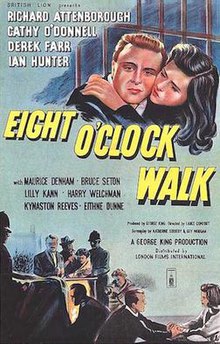Eight O'Clock Walk
| Eight O'Clock Walk | |
|---|---|

1954 poster for Eight O'Clock Walk
|
|
| Directed by | Lance Comfort |
| Produced by | George King |
| Written by | Jack Roffey Gordon Harboard Guy Morgan John Baines |
| Starring |
Richard Attenborough Cathy O'Donnell Derek Farr Ian Hunter |
| Music by | George Melachrino |
| Cinematography | Brendan J. Stafford |
| Edited by | Francis Bieber |
|
Production
company |
British Aviation Pictures
|
| Distributed by | British Lion (UK) |
|
Release date
|
|
|
Running time
|
87 minutes |
| Country | United Kingdom |
| Language | English |
| Box office | £94,602 (UK) |
Eight O'Clock Walk is a 1954 British drama film directed by Lance Comfort and starring Richard Attenborough, Cathy O'Donnell, Derek Farr and Maurice Denham. Its plot involves a taxi-driver who is tried for the murder of a young girl on a bomb site. Based on a true story,Eight o’Clock Walk is an anti-capital punishment film (the title refers to the hour at which executions were traditionally carried out) which points out the danger of circumstantial evidence resulting in the death of a mistakenly accused prisoner, it is only by good fortune that the film’s innocent protagonist gets away in this case – and the unstated message is clearly that not everyone might be so lucky.
Just-married taxi driver Thomas Lesley ‘Tom’ Manning is led to an abandoned bomb-site by an eight-year-old girl who says that she has lost her dog. The kind-hearted Manning gives her his handkerchief to dry her tears. She then runs off taunting Manning as an April-fool prank. He stumbles and raises a fist at her – and this is witnessed by Mrs Zunz.
The girl is later found murdered on the bomb site, strangled as she sang ‘Oranges and Lemons’ while feeding the ducks.
Manning is picked up by Scotland Yard for questioning and is later arrested and charged with murder, with circumstantial evidence including his handkerchief (found under the body of the girl), a fibre from his coat under the dead girl’s fingernail and the testimony of Mrs Zunz. A wartime pilot who suffered a head-wound, even Manning himself started to doubt his mind, and wondered if he had suffered from a "blackout"?
Manning's wife, Jill, convinced he is innocent, contacts lawyers, but the defending barrister refuses to see her and her imprisoned husband, because he wants to preserve an "objective view" on the case. She later wins the sympathy of the junior counsel Peter Tanner, who visits Manning in prison, believes in his protestation of innocence and makes the case his own.
The trial begins at London's Old Bailey, where Tanner is opposed by his father, prosecuting counsel Geoffrey Tanner. The trail is presided over by Justice Harrington, whose wife is in the hospital undergoing a serious operation.
It soon becomes evident that things are going badly for Manning. Jurors are seen expressing their belief in Manning’s guilt even before the trial was over. Irene's mother gave hearsay evidence that Manning had given the victim sweets, breaking down in tears and accusing Manning of murder. Following the testimony of prosecution-witness Horace Clifford, all of the evidence seems to point to Manning's guilt.
...
Wikipedia
